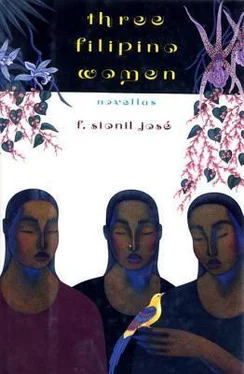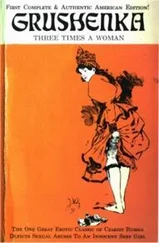Francisco Jose - Three Filipino Women
Здесь есть возможность читать онлайн «Francisco Jose - Three Filipino Women» весь текст электронной книги совершенно бесплатно (целиком полную версию без сокращений). В некоторых случаях можно слушать аудио, скачать через торрент в формате fb2 и присутствует краткое содержание. Год выпуска: 2013, ISBN: 2013, Издательство: Random House Publishing Group, Жанр: Современная проза, на английском языке. Описание произведения, (предисловие) а так же отзывы посетителей доступны на портале библиотеки ЛибКат.
- Название:Three Filipino Women
- Автор:
- Издательство:Random House Publishing Group
- Жанр:
- Год:2013
- ISBN:978-0-307-83028-9
- Рейтинг книги:4 / 5. Голосов: 1
-
Избранное:Добавить в избранное
- Отзывы:
-
Ваша оценка:
- 80
- 1
- 2
- 3
- 4
- 5
Three Filipino Women: краткое содержание, описание и аннотация
Предлагаем к чтению аннотацию, описание, краткое содержание или предисловие (зависит от того, что написал сам автор книги «Three Filipino Women»). Если вы не нашли необходимую информацию о книге — напишите в комментариях, мы постараемся отыскать её.
and
-examine the Philippine experience through the lives of three female characters, a prostitute, a student activist, and a politician.
Three Filipino Women — читать онлайн бесплатно полную книгу (весь текст) целиком
Ниже представлен текст книги, разбитый по страницам. Система сохранения места последней прочитанной страницы, позволяет с удобством читать онлайн бесплатно книгу «Three Filipino Women», без необходимости каждый раз заново искать на чём Вы остановились. Поставьте закладку, и сможете в любой момент перейти на страницу, на которой закончили чтение.
Интервал:
Закладка:
I demurred.
“Well,” she said, her eyes crinkling in a smile. “Aren’t we friends anymore?”
“I wouldn’t want Lopito to say I am using some of your time,” I said finally. “I have already said good-bye.”
She pulled me to the bamboo bench by the gate and we sat there. She had on a cheap, printed blue dress and wooden shoes. I could glory forever in her nearness.
“If I didn’t know you, I’d think you were jealous.”
“Of course not.” I glared at her. “How can I be jealous? How can …”
She caressed my face with her hand. I brushed it away.
“You are in love with me!” she exclaimed. “Eduardo Cortez. You — in love with me!”
“And if I am,” I said, “is that something to despise?”
She caressed my face again and this time, I let her, feeling her rough palm, all resentment gone. Then she held my hand. “But Eddie — you know it cannot be. I will not permit it. We grew up together. Remember how we used to run naked in the rain?” She was looking at me, her big, bright eyes brighter yet, the mischief in them coming through. “And remember this?” She pointed to the cleft in her chin. I smiled with memory and this warm, aching desire to hold her.
“You should be happy that you won’t be stuck with me,” she continued. “There is no mystery about me. I am open to you as you are to yourself. And marriage is something else — a kind of discovery every day …”
“Bullshit,” I said. “What is so mysterious about Lopito and his millions?”
The moment I said it, I was sorry, but Narita did not look away and her expression did not change.
“Eddie — you are so unfair. But I forgive you because you are in love with me. Look at it this way. We are in debt to them. Without Lopito, I would be stuck with this.” She cast a glance around her, at the bedraggled yard, the dilapidated house, the cadena de amor dying and brown on the brick wall.
Mother visited me at the dorm in Diliman a week after school opened. She brought the news that Narita’s father had died, that her mother was now alone in the house together with a niece and still minding the meat stall and that Narita was in Manila, staying at the Assumption Convent to finish college as arranged by Senator Reyes. She had asked where I was, Mother said, and was given my dorm address.
Sure enough, within the week, a note from her arrived. I knew her penmanship, the strong crosses of the t ’s, the forceful upsweep of the last letter. I had developed early enough habits of the collector and the scholar and I kept that note as well as the other notes that she passed on to me.
Hello Eddie,
You were not with us when Papa died, but I forgive you because you did not know. You did not have to hurry to Manila so early, whatever your reason, but I also understand that. I promised myself I would not be jealous of your girlfriend. I will major in political science and economics, but I don’t know if this school has the right teachers for me. I would like to be in your campus, but I should be here for this is a wicked city and I need protection. Please come and see me. I want someone to talk with. The girls here know nothing and I am bored most of the time. Will you do this as a favor?
Affectionately,
N
She always signed her letters to close friends with her initial. I did visit her once at Assumption but that was to escort my sisters there when they finally came to Manila. She did come twice to my dorm and my roommate and acquaintances were agog over the prettiest girl they had ever seen coming to visit wretched me.
My parents came to see me every so often and when my two younger sisters started going to college, Father thought it best to build a house in Manila which, in the long run, would save us money and also be a good investment. He bought a lot in Quezon City and we moved to the house within six months, with Mother commuting to Manila to keep two households. She brought back stories of home, of Narita’s mother finally closing her stall and just staying home, of Narita going to the old hometown with Lopito.
Narita visited us and stayed in the house for a night but I was out doing a field survey in Bulacan. When I returned, my sisters told me that when she arrived she was in tears. She had gotten a full scholarship, was tops in her class and would probably graduate summa, was taking singing lessons besides, and acting in the musical which the school was presenting. But these were not enough. Her schoolmates from Negros ignored her and did not even ask her to participate in the annual Kahirup Ball — the sugar bloc’s most lavish social event of the year.
Senator Reyes did not have enough empathy to see to it that his prospective daughter-in-law should be in it and Narita was too proud to ask. She had, perhaps, thought that simply being pretty and talented would be enough to get her accepted into the snootiest Negros circle.
She did not want to stay in the college dorm that night. She had an “important social engagement,” too, even if it meant sulking in an anonymous middle-class home in Quezon City.
Narita must have gloated when, shortly after the Kahirup snub, she appeared on the cover of the Women’s Week and was described as “sugarland’s prettiest, with a skin as clear as sunlight and eyes that sparkled like jewels …” It was a comeuppance that should have made her forget the slight, but she would never forget. She came again in December in our last year in college, not to wish us Merry Christmas, but to hand carry an invitation to her wedding. I opened the door and outside was the black Mercedes 220 SE of Senator Reyes with its khaki-uniformed driver. It was such a long time — more than two years — since I had seen her and though I often ached to catch a glimpse of that face, I thought it best to dampen the desire, to let things be. She wore no makeup, her brownish hair shining in the morning sun, her skin glowing. She walked up to me, saying, “Eddie, Eddie—” then she embraced and kissed me — a wet, warm kiss of affection, the scent of her, her hair swirling around me. I was glad to see her and gladder that I was finally as tall as she.
I led her to the house saying inanities while she plied me with questions about school, my career as a sociologist. I asked about her politics, starring in the school musical that was plastered in the society pages, and her singing so well that a bright career was foreseen for her. She waved them all aside, saying she just wanted to be alive, to do nothing if that was possible, and raise a dozen children.
That really brought me back to earth for those children that she would raise would certainly not be mine. Her wedding would be in two weeks.
I had a very good excuse for not going: My major term paper was due and I had to go to my village again to observe the farmers there and see how they were responding to the innovations in rural credit. So I was away when she got married in the Forbes Park church but there were pictures all over, including one in which she was being carried by Lopito over the threshold of the new house that Senator Reyes had built for them.
My sisters where pleased to go; it was their first “society” wedding. Mother and Father were also there, perhaps Narita’s “closest relatives.” Their presence was imperative for it was Mother who was the madrina and I ascribed that to Narita’s innate good sense. She was now my “sister” and I often laughed at how ridiculous it seemed afterwards.
By the time I finished college, I met a junior in the Department of Anthropology, a charming Cebuana with a slim figure and a cheerful disposition and, with her, it was easy to forget Narita. After graduation, too, I had a graduate assistantship in the department and before the end of the year, a scholarship to Harvard. I grabbed it although it meant some financial difficulty for my father who still had three other children to send to college.
Читать дальшеИнтервал:
Закладка:
Похожие книги на «Three Filipino Women»
Представляем Вашему вниманию похожие книги на «Three Filipino Women» списком для выбора. Мы отобрали схожую по названию и смыслу литературу в надежде предоставить читателям больше вариантов отыскать новые, интересные, ещё непрочитанные произведения.
Обсуждение, отзывы о книге «Three Filipino Women» и просто собственные мнения читателей. Оставьте ваши комментарии, напишите, что Вы думаете о произведении, его смысле или главных героях. Укажите что конкретно понравилось, а что нет, и почему Вы так считаете.












